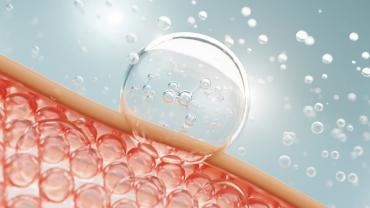
In addition to aesthetic purposes, skin health is critical for protecting the body from the external environment, regulating temperature, and performing other bodily functions. Collagen protein is a major structural component of the skin, constituting 75% of the skin’s dry weight. Human studies demonstrate that collagen supplements may promote the physiology and appearance of the skin by potentially “increasing hydration, elasticity, firmness, wrinkle reduction, and skin rejuvenation.”
Collagen loss begins at 18 to 29 years of age. After 40 years of age, the human body can lose approximately 1% of collagen per year. At approximately 80 years of age, endogenous collagen production can decrease 75% overall compared to young adults. Collagen loss may be due to free radicals, nutrient deficiencies, smoking, alcoholism, and disease. Collagen loss is associated with the appearance of aged skin, such as the formation of lines and wrinkles.
Although topical moisturizers are widely used in basic skin care, interest is growing in potentially moisturizing and nourishing the skin from the inside with dietary collagen. Many individuals, such as the elderly in particular, lack adequate protein in their diet. Even among those with a high protein intake, the richest sources of collagen (ie, animal skins, bone broth, and tendons) are not typically part of the modern Western diet. The amino acids of dietary collagen are very similar to those in human collagen. Thus, collagen peptide supplements may support normal body collagen turnover and renewal.
The results of a double-blind, randomized, placebo-controlled trial (n = 64) demonstrated that women aged 40 years to 60 years receiving 1,000 mg per day of collagen peptide supplements for 12 weeks had significantly improved skin hydration, wrinkling, and elasticity compared to a placebo. A systematic review (n = 805) confirmed promising results for the short- and long-term effects of oral collagen supplements (varying between 2.5 g per day and 10 g per day) for wound healing and skin aging. The researchers concluded that individuals taking collagen supplements had increased skin elasticity, hydration, and dermal collagen density.
Similar findings have been made in other systematic reviews and meta-analyses. Sun and colleagues stated that individuals taking oral collagen supplements had a statistically significant increase in skin hydration and a decrease in water loss compared to a placebo. Miranda and colleagues observed that 1,125 participants between 20 years and 70 years of age who were taking collagen supplements for 90 days had reduced wrinkles and improved skin elasticity and hydration. Barati and colleagues concluded that collagen peptides support skin health through direct effects on immune cells, including fibroblasts, macrophages, and regulatory T cells.
Collagen supports skin health by promoting moisturizing capacity, supporting the body’s natural generation of hyaluronic acid, and supporting skin barrier function. Adding collagen peptide supplements into shakes, smoothies, or other foods or beverages may promote an adequate intake of the unique amino acid composition of collagen to support skin health.
By Danielle Moyer, MS, CNS, LDN